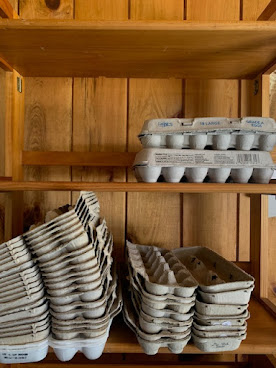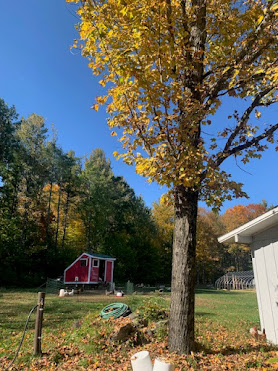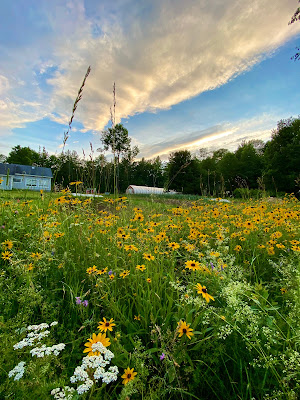Small, easy habits to reduce your Carbon footprint
There is no negotiating that this summer exhibited some of the symptoms of global climate change. People across the world personally felt the effects of droughts, flooding, devastating storms and new, unusual changes in the environment. Wildfire smoke made its way to the northeast, while other places around the country were suffering from power outages and halted public transportation due to heavy rainfall.
All of these things are a result of climate change. These changes in weather patterns are not going to slow down, and instead will more likely speed up and potentially become more severe. While there are major changes in production and various industries that need to happen to solve these issues, humans -- individuals, households and nations -- need to start doing their part to alter their lifestyles and ways of thinking in order to combat the impending environmental catastrophe ahead of us.
This post is not meant to be a lecture on climate change, but rather, a guide to how we can make small, doable changes to our daily routines that will allow us to reduce our carbon footprint. Small actions do add up over time, especially if they become healthy habits that are apart of your daily or weekly routine.
Here are our idea’s....
Shop local (not Amazon)
So many of the goods you buy online are delivered to your home wrapped in excessive packaging made of plastic, Styrofoam and paper. Companies like Amazon don’t care about the amount of waste they are producing, which is unfortunate as their consumers may not dispose of these packaging materials appropriately.
The best thing to do for consumers is to instead shop locally. This not only boycotts the mass production of goods and their packaging, but it strengthens the local economy. At CCF we buy as many gardening materials as we can at local hardware stores and gardening shops. We will be coming out with a future blog post about great places to shop locally in the Northeast!
Local thrift stores are a great way to shop local without spending too much money.Reuse
In the
same vein as reducing our packaging waste, reusing and repurposing your
goods is another great way to help reduce the amount of waste you are
producing. We repurpose old plastic salad containers for seeding, old towels for veggie storage,
plastic bags and egg cartons for share packaging. In the spirit of reusing materials, we also ask our customers to return jars and cans from our canned goods. For the 2022 season we are planning to use minimal plastic bags when packaging our weekly CSA shares.
We are also hoping to repurpose some of our old produce this year to use its seeds to plant new crops for next year. Seed extraction from older plants is a great way to reduce the amount of seeds needed for next season's purchase. Stay tuned to see how this goes for us this fall!
Invest in a CSA share
This one seems pretty obvious, but it is an easy and effective decision to sign up for a CSA share next year. Tying into the theme of purchasing local, not only does this help the local economy, but it supports sustainable small scale agriculture and utilizes less resources than purchasing produce grown hundreds if not thousands of miles away. Also, with a local CSA, there is no "middle man" so you know your farmer and you know exactly where your food is coming from.
Investing in a share is healthy for you and the environment. Here at CCF we grow all of our produce organically, which means we do not use pesticides, herbicides, synthetic fertilizers (oil based) which makes the produce cleaner for human consumption. Avoiding these chemicals as the grower also ensures a cleaner watershed and a healthier environment for insects and wildlife. Each season we add more flowers to the farm around the gardens to enhance habitat for pollinators. If you have any questions about the farm and our environmental practices make sure you read the rest of this post, or send us an email of Instagram DM.
Grow your own produce
Another way that you can support local, small scale agriculture is by doing it yourself! It's easy to find affordable fruit and vegetable seeds from your local hardware store. You can save money on purchasing produce and also boycott large scale agriculture by growing your own produce.
The option to grow your own produce allows you to be more self-sufficient and helps you to avoid those annoying trips to the store when you forget to buy produce. Like our shares, growing your own produce would mean that you know exactly what types of fertilizers you are putting on your food. This means that you won’t have to question the GMO and chemicals that might be present in store bought fruits and vegetables.
Carpool/bike/walk/public transportation. Consolidate driving trips.
While carpooling may still seem like a dangerous alternative to commuting alone with the COVID pandemic continuing to impact the entire world, you can still limit who you share rides with to your ‘bubble’ or pandemic social web. Commuting with friends to work, school or the gym can become a daily activity that saves you gas money and holds you accountable for being on time to these commitments.
Being conscious of the number of miles you drive is also important. Planning ahead for shopping helps reduce the number of times you need to get behind the wheel, as you are not faced with having to make multiple trips to the store.
Shower less and reduce water usage
Saving water is another important step to reducing your carbon footprint. Believe it or not, showering less and/or reducing your shower time is actually better for the natural oils in your skin and in your hair. Water has always been a priceless resource, but this notion became even more apparent this summer with the droughts and forest fires in the West.
After an extremely warm and dry season last year (2020), here at CCF we made a large investment in updating our irrigation system to be able to water all fields and greenhouses when needed, and to water as efficiently as possible without wasting water. All field and greenhouses are watered using drip tape. Drip tape is a tube like material that lays flat on the ground and runs down each planted row. The drip tape slowly releases water when pressurized by a pump, and the water penetrates the soil right at the base of the plant going straight to the root. Compared to overhead irrigation (sprinklers) this method requires much less water as you don't lose much to evaporation, and it is released in a very controlled manner only where the water needed (at the base of the plant).
At CCF we also we work to reduce our water usage by being conscious of how long we need to water our gardens and run the pump.
Eat less meat/fish
As many of you are probably aware, we frequently publish recipes on our blog using our farm fresh produce. A lot of these recipes are plant-based and are very environmentally friendly. Plant-based eating and veganism are better for the environment in that it reduces the amount of CO2 that is released into the atmosphere and reduces the amount of water needed to process the food, unlike products from the meat industry.
Additionally, eating less meat and fish has many health benefits like, reducing your likelihood of having certain cancers, improving your kidney function, lowering your risk for heart disease and other illnesses. Overall, veganism is better for your body and for the environment! Check out our recipes posts on the blog for some plant-based inspiration.
Shift to renewable energy (Common Energy)
Renewable energy is a recent discovery for CCF. As of last week we started subscribing to a company called Common Energy. Common Energy is a company that connects your electrical utility company to a local solar farm for free! This subscription not only reduces the amount of CO2 your home or business produces on a monthly basis, but it also saves you money. Signing up for this company is funded by New York State as it aligns with their goals to rely on 70% renewable energy by 2030.
YOU can also sign up for Common Energy! If you are interested in signing up or if you have any questions about this opportunity please email bloodeliza@gmail.com or visit https://www.commonenergy.us/impact/eblood.
This is a very simple idea, but bringing a reusable bag to the grocery store allows you to cut down on your plastic bag consumption. If they rip, bags are easy to patch with scrap fabric. You can also reuse clean plastic baggies for snacks and veggies. We do this at CCF!
Think about your consumption
Before spending money on gifts or personal items consider your consumption. With the holidays approaching it's a good idea to consider what types of gifts you are spending money on for others or for yourself.
Things to consider when purchasing goods include: How were these gifts made? Who were these things made by? Will these gifts be useful to their recipient in 2 years or will they just get thrown away?
Like we mentioned before shopping local is a great way to support your local economy and buy goods that are less processed. Consider investing in experiential gifts like a gift card to a restaurant or a ‘girl’s day out.'
Donate or sell used items
Instead of investing in new clothing, why not save money by going to your local thrift store or Salvation Army? You can also sell your clothing here or at a future garage sale/tag sale and even on Facebook Marketplace. This is another great strategy that will help you strengthen the local economy and save money along the way!
Do your BEST!
While all of these habits may be overwhelming, we want to emphasize the importance of doing what you can and doing your best with all of this. You don’t have to live ‘waste free’ in order to begin the reduction of your carbon footprint. This post is meant to inspire you to act and change things in your daily life in a way that doesn’t feel restrictive.








ReplyDeleteI agree with a lot of the points you made in this article. If you are looking for the Buy Fruits Online Singapore, then visit Mamak Shop. I appreciate the work you have put into this and hope you continue writing on this subject.
You have done great work by publishing this article here. It is useful and convenient info for us. Keep upgrading our knowledge by share articles like vegetable packaging bags. thanks.
ReplyDeleteExcellent knowledge, You are providing important knowledge. It is really helpful and factual information for us and everyone to increase knowledge. Continue sharing your data. Thank you. Read more info about warehouse racking
ReplyDeleteI read this article, it is really informative one. Your way of writing and making things clear is very impressive. Thanking you for such an informative article.household storage facility in Bangalore site.
ReplyDelete